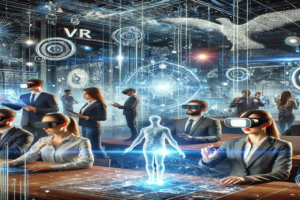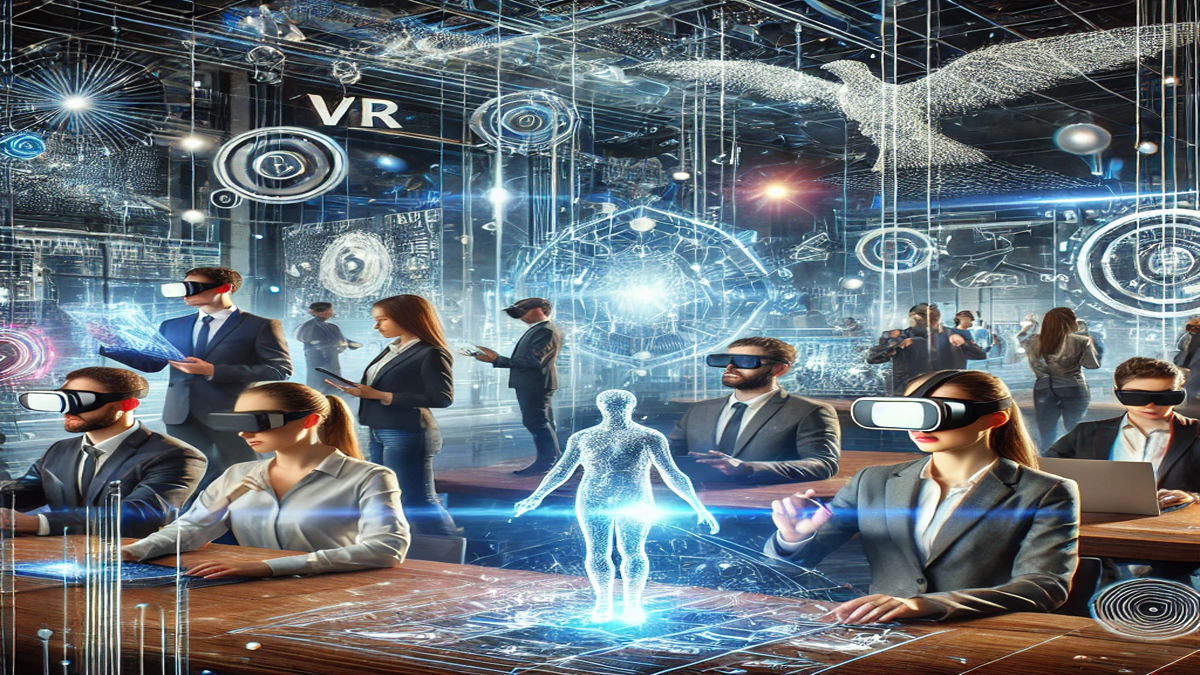The world of immersive technologies is rapidly evolving, with companies like Tagbin at the forefront transforming how we interact, learn, and experience the digital realm. From augmented reality (AR) and virtual reality (VR) to mixed reality (MR), immersive technologies are redefining industries like entertainment, education, healthcare, and retail. These innovations offer unique, engaging, and interactive experiences that bridge the gap between the real and digital worlds. In this article, we’ll explore what an immersive technologies company does, its role in driving digital transformation, and the key industries being revolutionized by this technology.
What is an Immersive Technologies Company?
An immersive technologies company specializes in developing, implementing, and enhancing technologies that create interactive and multi-sensory experiences. Companies like Tagbin leverage cutting-edge tools like AR, VR, MR, and extended reality (XR) to deliver more engaging and memorable experiences for users.
Key Technologies Used by Immersive Companies:
- Augmented Reality (AR): Overlays digital content onto the real world via devices like smartphones, tablets, and AR glasses.
- Virtual Reality (VR): Offers a fully immersive, computer-generated environment experienced using VR headsets.
- Mixed Reality (MR): Blends elements of AR and VR to allow users to interact with both real and virtual objects simultaneously.
Companies in this space provide services such as app development, hardware production, 3D modeling, and content creation for various sectors, from entertainment to education.
How Immersive Technologies Are Transforming Industries
The impact of immersive technologies can be seen across a wide range of industries, enhancing user engagement, improving training processes, and offering novel marketing solutions.
1. Entertainment and Gaming Immersive technologies have revolutionized the entertainment and gaming industries. Virtual reality gaming experiences place users directly inside the game environment, offering unparalleled interactivity and engagement. Platforms like Meta’s VR headsets and VR arcades provide players with a fully immersive gaming adventure.
2. Education and Training AR and VR are reshaping education by offering immersive learning experiences. For example, students can explore historical sites through VR or conduct virtual science experiments. In corporate training, employees can practice real-world scenarios in a safe, controlled VR environment.
3. Healthcare and Medical Training Immersive technologies are enhancing healthcare services by providing VR-based therapeutic experiences and MR-powered surgical training. Doctors and surgeons can practice complex procedures in a simulated environment, improving precision and reducing medical errors.
4. Retail and E-Commerce Virtual try-ons and AR shopping experiences are transforming the retail sector. Customers can visualize products in their environment before purchasing, offering a more interactive shopping experience. Retail giants like IKEA and Sephora have already adopted AR apps for product visualization.
5. Real Estate and Architecture Immersive technologies enable potential buyers to experience 3D virtual tours of properties without visiting them in person. Architects and developers can showcase designs in MR environments, allowing stakeholders to visualize construction projects before they are built.
Why Partner with an Immersive Technologies Company?
Organizations partner with immersive technologies companies like Tagbin for their technical expertise, creative design, and ability to develop custom solutions. Here’s why businesses choose these companies for their digital transformation:
1. Custom AR/VR Solutions An immersive technologies company like Tagbin offers tailor-made AR/VR applications to address specific business challenges. Customization ensures solutions are aligned with an organization’s branding, goals, and industry needs.
2. Cost-Effective Innovation Instead of developing in-house AR/VR solutions, businesses can save time and resources by outsourcing to a dedicated company like Tagbin with technical proficiency and specialized skills.
3. Expertise and Technical Skills Immersive technologies companies employ professionals skilled in 3D modeling, software development, and UX/UI design. Their in-depth knowledge allows them to create sophisticated, user-friendly immersive experiences.
4. Faster Time-to-Market Time is critical in fast-paced industries like entertainment, healthcare, and retail. By collaborating with an experienced immersive company like Tagbin, businesses can expedite the development of AR/VR applications, ensuring timely project delivery.
Key Features to Look for in an Immersive Technologies Company
If you’re considering hiring an immersive technologies company, here are the key features to evaluate:
- Portfolio of Past Projects: Look at the company’s previous work in AR/VR/MR development.
- Technical Expertise: Ensure the company has a diverse team of developers, designers, and 3D artists.
- Industry Experience: Check if the company has worked with businesses in your industry (e.g., education, healthcare, retail).
- Client Testimonials: Positive client reviews and case studies reflect the company’s ability to deliver impactful solutions.
- Post-Launch Support: Post-launch support is crucial for ensuring the ongoing success of AR/VR applications.
Future of Immersive Technologies Companies
The future of immersive technologies is promising, with AR, VR, and MR continuing to evolve. Companies like Tagbin in this sector will drive the development of next-gen experiences that offer deeper interactivity, smarter AI-driven interactions, and greater accessibility.
Emerging trends for immersive technologies companies include:
- Metaverse Development: Immersive technologies are at the core of metaverse creation, enabling fully interconnected 3D virtual worlds.
- AI-Driven Experiences: Artificial intelligence will drive smarter, more personalized immersive experiences for users.
- Wearable Tech Advancements: Companies are working on developing lightweight, more affordable AR/VR headsets.
- 5G-Powered Immersion: Faster 5G networks will reduce latency, enabling real-time, high-quality immersive experiences on mobile devices.
FAQs
An immersive technologies company specializes in developing AR, VR, and MR solutions for industries like gaming, healthcare, education, and retail. Companies like Tagbin create interactive and multi-sensory experiences that engage users in a digital-physical blend.
Immersive technologies enhance customer engagement, streamline training processes, improve healthcare outcomes, and increase sales through virtual shopping experiences. Companies like Tagbin help businesses achieve operational efficiency and competitive advantage.
The leading industries using immersive technologies include entertainment, education, healthcare, real estate, and retail. Each sector leverages AR, VR, and MR to enhance customer engagement, learning, and operational efficiency.
Immersive companies like Tagbin offer services such as AR/VR development, 3D modeling, XR app creation, virtual tours, interactive training simulations, and custom AR/VR app development tailored to industry-specific needs.
Look for a company with experience, a strong portfolio, technical expertise, industry-specific knowledge, and excellent client reviews. Companies like Tagbin also offer ongoing support post-launch for smooth operations and updates.
Content Source – https://medium.com/@priyankapandey08/immersive-technologies-company-revolutionizing-experiences-with-innovation-61dda46830be











